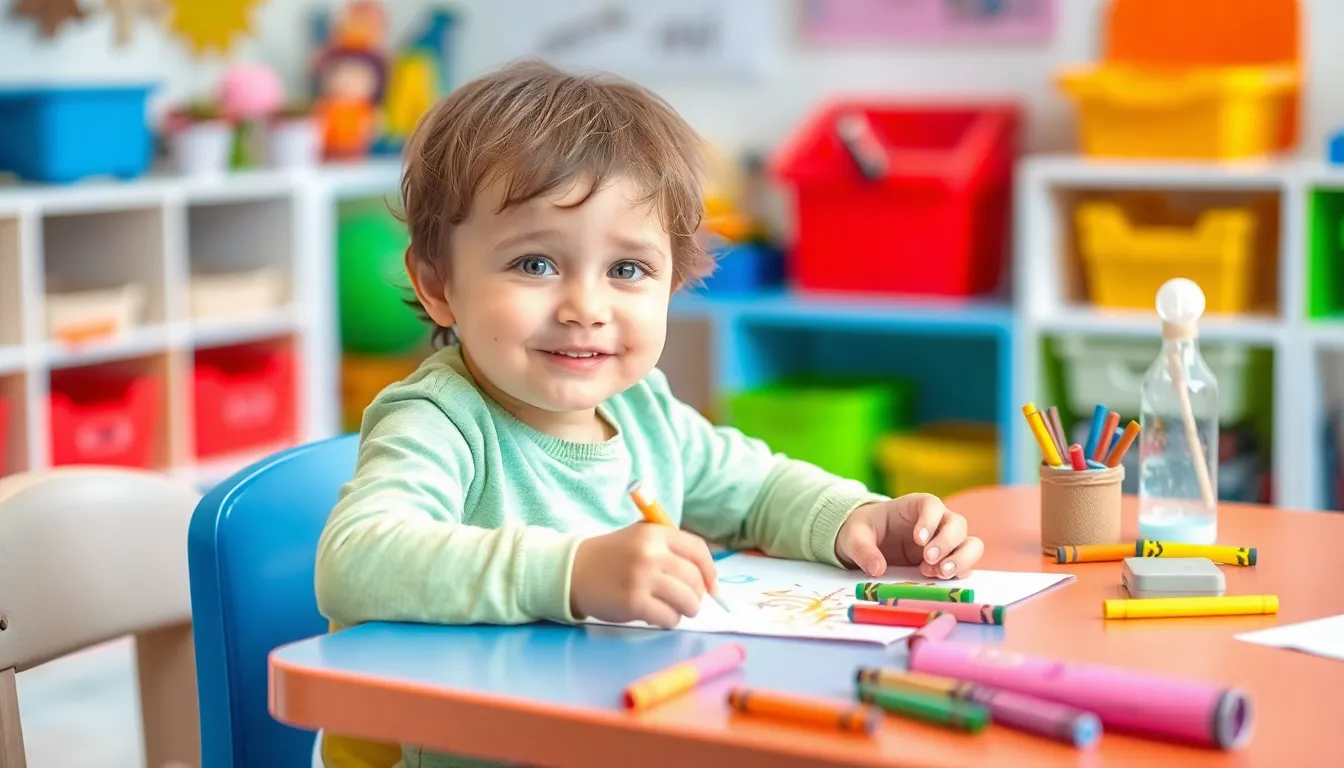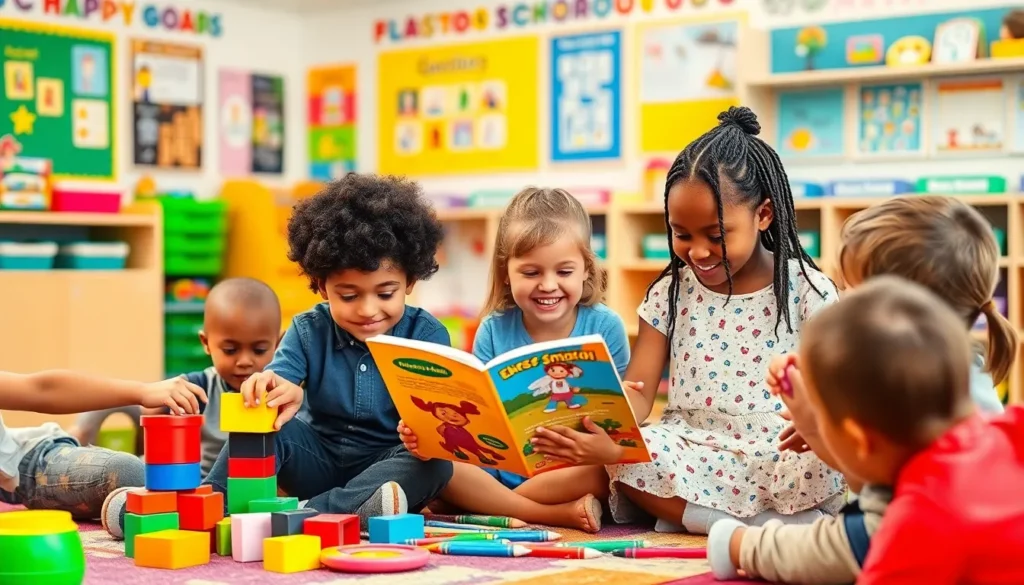Table of Contents
ToggleDeciding when to send kids to preschool can feel like navigating a maze made of crayons and glitter. Parents often find themselves asking, “Is my little Picasso ready for the big kids’ table?” While there’s no one-size-fits-all answer, most children start preschool between the ages of three and four. It’s a magical time when they trade in their diapers for backpacks and learn to share toys instead of just their snacks.
Preschool isn’t just about finger painting and snack time; it’s a vital stepping stone for social skills and early learning. By the time they’re primed for kindergarten, kids will have mastered the art of making friends and possibly even how to tie their shoes—if they’re lucky! So, let’s dive into the delightful world of preschool and explore when the right time might be for your little one to take that exciting leap.
Understanding Preschool Age Requirements
Preschool enrollment typically begins around age three. Many programs require children to be at least three by a certain date, often aligning with the school year. Children gain benefit from attending preschool, where they engage in both structured learning and social interactions.
Age four represents a common standard for preschool entry. By this age, children often exhibit readiness for more organized activities. Emotional and social development plays a critical role at this stage, as kids learn to navigate relationships with peers and adults.
Parents may find age requirements differ between preschools. Some institutions might accept younger children based on readiness or developmental milestones. Evaluating each child’s unique growth is essential, as some may thrive better in different environments or age groups.
Most preschools focus on early literacy, numbers, and social skills. These foundational areas prepare children for the transition to kindergarten. When looking at programs, parents should consider factors such as curriculum, teacher-student ratio, and overall child engagement.
Flexibility exists within preschool options, catering to diverse family needs. Part-time programs attract families wanting gradual exposure, while full-day options suit those requiring more hours of care. Selecting the right fit requires understanding individual child needs and family logistics.
Overall, preschool serves as a critical stepping stone in a child’s educational journey. Identifying the appropriate age and requirements significantly influences a child’s developmental success.
Factors Influencing Preschool Enrollment

Several factors affect the decision to enroll children in preschool. Age, developmental readiness, and family logistics play critical roles in this process.
Child’s Developmental Readiness
Child’s developmental readiness varies significantly. Some children exhibit skills like sharing and following directions earlier than others. Social skills, independence, and emotional regulation contribute to their readiness for preschool settings. Many preschools assess these factors through observations and assessments. A child’s ability to engage with peers and respond to structured activities indicates their preparedness. Parents should consider individual milestones, as they guide the decision for the appropriate enrollment age.
Family Considerations
Family considerations greatly impact preschool enrollment decisions. Parents evaluate daily schedules, work commitments, and available support systems. Each family’s unique dynamics shape their preferences for part-time or full-day programs. Trained staff, safety protocols, and curriculum offerings also play significant roles in choosing a preschool. Some families prioritize proximity to home or work, while others seek specific educational philosophies. Family values and expectations directly influence the decision-making process in selecting the right preschool.
Different Preschool Programs
Multiple preschool programs cater to varying educational philosophies and family needs. Understanding these options helps parents select the best fit for their children.
Traditional Preschools
Traditional preschools usually follow a structured curriculum, focusing on early literacy, numbers, and social skills. Children engage in guided play and group activities, encouraging interaction with peers. Standards and routine play essential roles in daily schedules, promoting a balance of learning and socialization. Teachers often emphasize preparing children for kindergarten by introducing foundational academic concepts. Many traditional programs require children to be three by a specific date to enroll, ensuring readiness for the curriculum’s demands.
Montessori and Alternative Schools
Montessori and alternative schools prioritize child-led learning, allowing kids to explore at their own pace. These programs often emphasize hands-on activities, fostering independence and creativity. In such environments, children choose what to learn, guiding their educational journey. The mixed-age classrooms create opportunities for peer interaction and mentorship. Enrollment policies vary, with some accepting younger children based on individual readiness, making these schools appealing for diverse developmental needs.
Common Misconceptions About Preschool
Many believe that preschool focuses solely on play. This perspective overlooks crucial social skills and early learning experiences fundamental to child development. Understanding that preschool prepares children for kindergarten is essential; it shapes their ability to make friends and gain independence.
Another misconception centers on age requirements. Parents often think children must be four to enroll. While four is a common entry point, many preschools accept three-year-olds if they demonstrate readiness. Children mature at different rates, and some younger kids thrive in preschool settings.
Parents might also assume that all preschools provide the same experience. Diversity exists among preschool programs, including traditional preschools, Montessori schools, and alternative approaches. These options focus on various educational philosophies, catering to different family needs and children’s learning styles.
Some might worry about their child’s social readiness, believing children must already be experts in sharing and following directions. In reality, preschools often help children develop these essential skills. Programs use observations and assessments to gauge each child’s readiness, supporting their growth through structured activities.
Proximity to home or work often drives preschool selection, but personal philosophies should also factor in. Prioritizing educational values and safety fosters a supportive environment for children. Parents benefit from exploring multiple options to find a program that aligns with their expectations and their child’s unique development.
Such misunderstandings about preschool can impact decisions, but recognizing the value of early education remains crucial. The collaborative nature of preschool helps set a strong foundation for a child’s future success.
Deciding when to send a child to preschool is a pivotal choice for parents. It’s essential to consider not only the child’s age but also their developmental readiness and individual needs. Preschool plays a vital role in fostering early learning and social skills that will benefit children as they transition to kindergarten.
With various programs available, parents can find options that align with their educational values and family schedules. By understanding the different preschool philosophies and requirements, families can make informed decisions that support their child’s growth and prepare them for future success.





